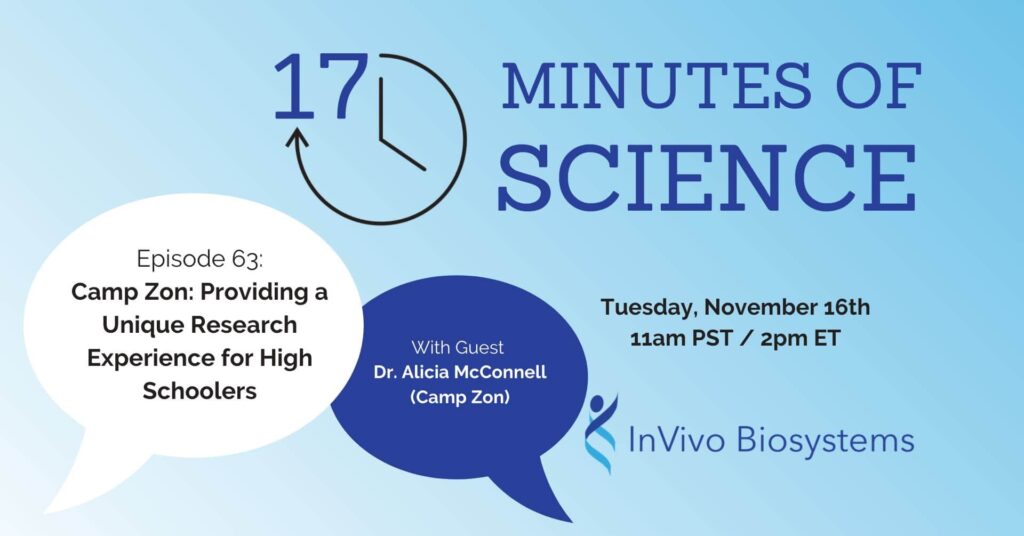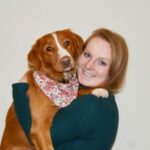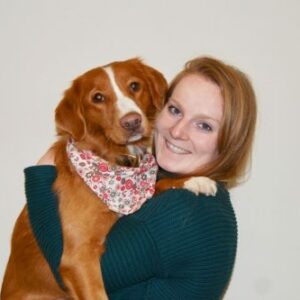Tune in to episode 63 as we talk with Dr. Alicia McConnell about Camp Zon, a two week research opportunity for high schoolers to get real-life experience working in a research lab. High schoolers get to experience all stages of the research process, from designing their experiment and collecting data to analyzing and presenting their findings. The goal of the program is to encourage more students to pursue STEM carers by getting them a positive and fun lab experience before they’ve reached college.
Alicia McConnell is a postdoctoral fellow studying melanoma using zebrafish at Boston Children’s Hospital in Leonard Zon’s laboratory. She received her PhD from Duke University in Cell Biology working on lung stem cell biology and the effect of radiation on the lungs. Since the first year of graduate school Alicia has participated in and eventually led science education outreach efforts. She is passionate about increasing diversity in STEM and improving scientific literacy through outreach.
Transcript
Hannah Huston (Host): [00:00:11] Hello and welcome to 17 Minutes of Science, our show that explores the world of science and how it affects both the starting academic and the seasoned professional. I am Hannah Huston and today I am joined by Alicia McConnell. Alicia is a postdoctoral fellow studying melanoma using zebrafish at Boston Children’s Hospital in Leonard Zon’s lab. She received her Ph.D. from Duke University in Cell Biology, working on lung stem cell biology and the effect of radiation on the lungs. Since the first year of graduate school Alicia has participated in, and eventually, led science education outreach efforts. She is passionate about increasing diversity in STEM and improving scientific literacy through outreach, which is what we will be talking about more today. Welcome, Alicia.
Dr Alicia McConnell (Guest): [00:01:01] Thank you.
Hannah Huston (Host): [00:01:03] So I’m going to start my timer and we can jump on into it, so, you were one of the founders of Camp Zon. Can you tell us more about what this is?
Dr Alicia McConnell (Guest): [00:01:18] Sure, Camp Zon is a two week high school research experience where students are studying anemia, using zebrafish, and we break the students into teams, they generate hypotheses, design experiments, collect data and then analyze their data. And the really exciting part of the camp is when – at the very end, when the students put their data together in a presentation and actually present it to the lab and answer questions from the lab, just like a lab meeting. They also have the opportunity to interact with lots of scientists at different stages in their career, as well as physicians, medical doctors, in the form of a career panel or through lectures and discussion sections.
Hannah Huston (Host): [00:02:09] Wow, that sounds like such a great opportunity for these students.
Dr Alicia McConnell (Guest): [00:02:12] Yeah, definitely.
Hannah Huston (Host): [00:02:13] So what inspired you to start Camp Zon?
Dr Alicia McConnell (Guest): [00:02:18] I was inspired to start Camp Zon, actually – [because] for a while now, I was noticing that in every lab I worked in previously, and just in biomedical research in general, the majority of people kind of get their start, especially at that really early high school age, working in biomedical research labs through – [the opportunity to do so] arriving through connections with family or networking connections. So they basically already have to be connected into that world. And so I saw how difficult it was for students that may not have access to biomedical research or know anyone that does this as a career to even know about career options in this field. And I think that’s really impactful because one thing that I am really passionate about is increasing diversity in STEM. And so I wanted to make sure I created an opportunity that was not only a realistic lab experience that maybe is different than what a student might experience in their classroom in school, but also expanding that access to students that don’t have prior research experience or don’t have research connections.
Hannah Huston (Host): [00:03:34] Right. That’s wonderful. We need more programs like that. So is this reflected then in the mission of Camp Zon – to increase that diversity in STEM?
Dr Alicia McConnell (Guest): [00:03:47] Yeah, exactly. I think that providing that authentic biomedical research experience was definitely our goal in expanding access and introduce career opportunities as well, particularly from students with diverse backgrounds. I think that we’ve really been able to achieve that mission over the years because we’ve partnered with various programs like Boston Public Schools and the coach program at Boston Children’s Hospital to recruit and get applications from students, you know, from a wide variety of backgrounds, which is really exciting. And we’ve also been able to make it more achievable for people from various socioeconomic backgrounds as well by making this actually a paid research experience. So that is pretty unique for a high school program.
Hannah Huston (Host): [00:04:42] Yeah, and probably makes it much more incentivizing to a lot of students who might need that paid opportunity, and now they can get a great educational opportunity as well. So Camp Zon uses zebrafish. How have the students reacted to working with the fish?
Dr Alicia McConnell (Guest): [00:05:01] I personally love using zebrafish in not only my work but outreach, but because really it’s like the most amazing way to to kind of have these complex, often theoretical topics become more tangible. And I think students respond extremely well to it. They love seeing the fish, not only in our huge aquarium that we keep all of our tanks in in our lab, but also particularly they love to see the embryos develop. I think one of the most amazing and beautiful things about zebrafish is that you can actually watch their development happen because it’s outside of the mother, and so they develop from a single cell embryo in these clear little bubbles called chorions. And they you can really watch them over a matter of a couple of days generate all of their organs, including a beating heart, slowing blood cells and to visualize that just under a light microscope is just amazing. You know, even as a scientist seeing it so many times, I definitely still get excited over it. And I think it’s a really big point to spark students’ interest in biology to just be able to naturally watch and observe. And I think it also encourages them to come up with further scientific questions and hypotheses when they’re just watching natural development. It kind of sparks that curiosity that’s innate in all of us.
Hannah Huston (Host): [00:06:29] Right, and the way you’re describing it, it really makes zebrafish sound like such an approachable model because you can see all of these stages and it’s not very intimidating to work with. And so that’s it’s so great that you’re able to introduce students to this, because I bet a lot of them are like, ‘What do you mean? We’re we’re going to use a fish? Isn’t that what you get at the pet store?’
Dr Alicia McConnell (Guest): [00:06:49] Exactly, exactly.
Hannah Huston (Host): [00:06:53] So Camp Zon has been running since 2019. Can you tell us more about how the program has evolved since the first year?
Dr Alicia McConnell (Guest): [00:07:03] Sure. So like I said, our goal is to expand access, so we definitely have achieved that, in that we started with 12 students and this past year in 2021, we moved up to 30 students that were high schoolers, which was really exciting. But –
Hannah Huston (Host): [00:07:20] Wow, that’s doubled.
Dr Alicia McConnell (Guest): [00:07:20] Yeah, yeah, exactly. In three years, but the most exciting thing is that we moved online. Obviously, this was a little forced on us due to the pandemic. As in almost every situation, but we went virtual in 2020 and ended up slightly changing our format, but still kept the two week research experience – same research questions and hypotheses and interaction with the data. But instead of having the students be the ones physically handling the fish, we have everything filmed on video, you know, live following us around in lab videos, and we hand the students the data and then they do their own analysis. So we actually take surveys every year and found that the student learning outcomes and experience that they had with the program ranked just as highly for the in-person and virtual programs, which is really awesome. And in addition, we added college mentors. And I think this kind of created a more supportive and welcoming environment that made high school students feel comfortable because they could have these small group discussions with their college mentors and really open up, come out of their shell and ask lots of different questions.
Hannah Huston (Host): [00:08:39] So are those college mentors students who have gone through the program in the past? Or how do you recruit these college mentors?
Dr Alicia McConnell (Guest): [00:08:47] Yeah, we did actually have one of them who is in person in 2019 happened to get in touch with us, and I said we would love to have you back. And so she served as a college mentor for the program, which was really awesome. Most of the other college mentors, we just solicit openly through colleges around the Boston area and, yeah, get some people through that way. And then they are assigned a group of five students each. So they also get a lot out of the program as well. We’ve heard from them that it’s not only a mentorship experience for them, but they are also participating on the career panels and hearing all of these stories and looking at the various career opportunities. So I think it’s kind of a win-win.
Hannah Huston (Host): [00:09:41] Yeah, it sounds like it. And what a full circle for that one student who participated in the first year to now get to be a mentor. That’s so wonderful. So since you had to go virtual due to the pandemic, do you think you’ll stay virtual going forward in order to have a broader pool of participants? Or is the aim to get physically back in the lab as soon as possible?
Dr Alicia McConnell (Guest): [00:10:06] Yeah, that’s a great question, and we really debated over this quite a bit, but we did decide to stay virtual in the future. Given that the outcomes and were just as positive virtually versus in-person, we were really encouraged by that data. And as you said, the virtual format really allows us to kind of focus on our mission of expanding access. And so I think it would be physically impossible to host 30 students in in the lab space. We’d have to have a dedicated lab just for Camp Zon. So I think this year was definitely wouldn’t have been possible if we had been in-person. So we were really excited to keep it virtual because actually next year in 2022, we’d like to open it to 36 students.
Hannah Huston (Host): [00:11:00] Wow.
Dr Alicia McConnell (Guest): [00:11:00] Yeah, that’ll be fun.
Hannah Huston (Host): [00:11:02] So are your students from all over given that it is a virtual program or do you still try to keep them in the Boston area?
Dr Alicia McConnell (Guest): [00:11:13] Ok. Yeah, that’s a great question, so for – because it is a paid experience and Massachusetts laws being as they are, we do have to have them come in person one day for an onboarding visit. But additionally, we have to have them located in Massachusetts. But we’ve had students from quite a far hour driving distance within Massachusetts and prior to it being a paid experience, we actually had students from New Jersey, California, Minnesota. So it was quite widespread. But then, with the addition of the, you know, the great addition of the payment, we did have to limit it a little bit to Massachusetts, but we think ultimately it will help the program grow.
Hannah Huston (Host): [00:11:57] That’s really cool. So you’ve said that the program is two weeks long. What was the thinking behind having it two weeks instead of four weeks or one week?
Dr Alicia McConnell (Guest): [00:12:09] Yeah. So that came a little bit out of practicality on, not only the researcher side, but the student side as well. We would have students come and stay in the lab for various – prior to the creation of Camp Zon – students would stay in the lab for varying amounts of time, and we found that after two weeks they weren’t necessarily getting a ton out of the experience. And also the researchers time that was hosting them as a mentor was getting taken up a lot as well. So we wanted to kind of pick a time frame that was digestible from a teaching perspective, not only from us leading the program, but also for the students taking it that it’s enough time that they can get something great out of it and can see a complete research project while limiting it to not take up, you know, a full time staff of researchers dedicated to the program. So it’s definitely a practical decision, but I think it’s worked out really well.
Hannah Huston (Host): [00:13:15] Yeah, well, I mean, if it’s working, then it’s working, and no reason to change it. And two weeks seems like a pretty good amount of time for students to really get a thorough experience and, you know, learn a lot.
Dr Alicia McConnell (Guest): [00:13:31] Exactly, that’s what we felt.
Hannah Huston (Host): [00:13:33] So where do you hope Camp Zon will be in another 5 years or 10 years?
Dr Alicia McConnell (Guest): [00:13:41] Yeah, this is really exciting to think about, especially because we just created the program from scratch three years ago already, and to see it grow, so much has been really exciting. So I would love to see it continue to increase the reach in the number of students that are able to participate. And perhaps that might look like adding additional offerings like a Winter Camp Zon as opposed to just the summer program, you know [have a] program over their winter break or spring break or something like that. I think that would be nice to have it at different times of the year to hit different student populations. I also would like to see Camp Zon coming up with different experimental variations. So right now we focus on anemia, but actually half of the Zon lab studies melanoma as well. So it would be really cool to have like a cancer version of Camp Zon or anemia version or a CRISPR version of Camp Zon. And so I think incorporating these different real life research projects that we have going in the lab more into the camp would be a really cool way for it to grow.
Hannah Huston (Host): [00:14:52] Right, pique the interest of some students who might not be that interested in anemia, but they really want to study or do something with CRISPR, you know, that could just open up a whole new audience for you guys.
Dr Alicia McConnell (Guest): [00:15:03] Right, exactly.
Hannah Huston (Host): [00:15:06] So do you, do you have any hopes for camps on being kind of a like a template for programs like this for other researchers to adopt in their own labs?
Dr Alicia McConnell (Guest): [00:15:20] I would absolutely love that. I think it’s a really achievable program to kind of recreate in any lab, really, because it requires just a few people, lab members that are willing to give lectures, be on career panels. And then, for instance, myself and the co-director Chloe Barron, she and I have worked hard to create this two week experience, but it could really be replicated anywhere and with any subject matter. And so I think just plugging in different hypotheses and different experiments would be definitely achievable in any lab. So I would welcome contact from anyone who’s interested in getting it going on their own.
Hannah Huston (Host): [00:16:10] That’s wonderful. Well, we have just under a minute left today, and I was wondering if you could tell us a little bit more about what your personal plans for the future are. Are you hoping to stay involved in STEM outreach and education?
Dr Alicia McConnell (Guest): [00:16:29] Yeah, I definitely will, hopefully incorporate it into my career in the future. I think no matter where I go in academia or industry, I would really like to continue that mission of expanding access to STEM and increasing diversity in STEM. So I would like for that to stay as central as possible for my future career, for sure.
Hannah Huston (Host): [00:16:56] Well, that’s wonderful, and I just stopped my timer, so it didn’t go off right at one second left, so good timing there. Alicia, it was wonderful to talk with you today and learn more about Camp Zon. It’s an incredible program that you have going there.
Dr Alicia McConnell (Guest): [00:17:12] Thank you so much, and thank you for the opportunity to share.
Hannah Huston (Host): [00:17:16] Yeah, well, thank you, everyone for tuning in to 17 Minutes of Science. We will see you next time.



